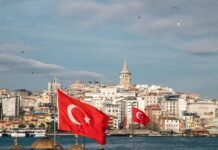Turkey’s controversial referendum result, which has been marked and shadowed by widespread and systematic frauds and scandalous move by biased Supreme Board of Election (YSK), has received mix reactions from European leaders on Monday.
German Chancellor Angela Merkel has urged the Turkish government to seek respectful dialogue with all political and societal powers in the nation after a tough referendum campaign, saying that the close outcome of the referendum shows “how deeply split Turkish society is.”
Turkey’s autocratic President Recep Tayyip Erdoğan on Sunday won support from 51.3 percent of Turks, amid widespread election frauds allegations, for a package of constitutional amendments that increase the powers of his office.
In a joint statement with German Foreign Minister Sigmar Gabriel on Monday, Merkel said that “There needs to be talks about these issues as soon as possible with Turkey on a bilateral basis, as well as between Turkey and European institutions.”
The close outcome “means the Turkish government and President Erdoğan personally need to take on a great responsibility,” they said. The statement has reiterated the European Union’s (EU) commitment to democracy and the protection of basic human rights.
French presidential candidate Emmanuel Macron separately told RMC radio that there would be no progress in Turkey’s application to join the trade bloc in “coming years.”
S&D SAYS EU SHOULD SUSPEND TALKS WITH TURKEY
Meanwhile, Gianni Pittella, president of the Socialists & Democrats (S&D) Group in the European Parliament, has described the result of a public referendum held in Turkey on Sunday as “another harsh blow against democracy and the rule of law in Turkey,” calling on the EU to suspend membership talks with the country.
“Another harsh blow against democracy and rule of law has been dealt in Turkey. This is yet another decisive step away from Europe. Erdoğan has closed his doors to the EU with this referendum. The EU accession talks should be suspended once Turkey decides to implement the 18 constitutional amendments,” said Pittella in a press statement on Monday.
Pittela also talked about alleged irregularities during the voting process, saying that they may cast a shadow over the final outcome.
“Many irregularities across the whole of Turkey have been alleged; irregularities that may cast a shadow on the final outcome. We, therefore, are looking forward to the official assessment by the Organization for Security and Co-operation in Europe (OSCE) / Office for Democratic Institutions and Human Rights (ODIHR) International Observation Mission,” he said.
“We remain convinced that the majority of Turkish citizens are still looking at democracy and rule of law as crucial benchmarks. Unfortunately, Erdoğan is increasingly turning Turkey into a personal authoritarian regime.”
“The S&D Group will do whatever it takes to reinforce democracy and rule of law against the authoritarian drift carried out by the Erdoğan. Nevertheless, the S&D Group requests the Council to envisage all the necessary measures in order to suspend the EU accession talks with Turkey. Europe cannot turn a blind eye and remain silent – and Europe will not.”
S&D MEP Kati Piri, the European Parliament’s rapporteur on Turkey, also expressed her disappointment with the referendum result in a press statement on Monday. “This is a sad day for all democrats in Turkey. In an unfair election environment a very narrow majority has endorsed a constitutional change that will give President Erdoğan unchecked powers. With such a constitution, Turkey cannot join the EU.
“As rapporteur, I’ll continue to stand by all those fighting for democracy and fundamental rights in Turkey. Today’s outcome shows there are millions of Turkish citizens who share the same European values and who chose a different future for their country. The EU should never close the door to them,” she said.
Moreover, Belgian Foreign Minister Didier Reynders said on Monday the EU should be concerned about the outcome of a referendum in Turkey and observe it closely in order to avoid a further crackdown on dissent.
Speaking during a broadcast by the Premiere radio station on Monday, Reynders said EU member countries should follow with concern how the new presidential powers are used in Turkey. “We should be vigilant as there is already existing concern that emerged after the crackdown in the wake of the attempted coup [last summer in Turkey]. Any further clampdown must be avoided with the advent of the new presidential powers,” he added.
ERDOĞAN: TURKEY MAY TAKE EU ACCESSION PROCESS TO BREXIT-LIKE REFERENDUM
On the other hand, Turkish President Erdoğan reiterated on Monday that Turkey may hold another referendum on whether to continue with its EU accession process, similar to how Britain voted to exit the EU. In televised remarks to a crowd of supporters at the presidential palace in Ankara as part of celebrating a narrow win in Sunday’s referendum, Erdoğan said, “They [EU] will either immediately keep the promises it made to Turkey, or it will face its consequences.”
“They threaten us with [ending] the membership [process]. No problem. Let them decide as soon as possible and notify us. … We can hold a referendum for that, too. England did a Brexit and left the EU, which it founded. Norway left the EU, too. It is for the people to decide. We will go to the people and carry out their decision,” he said.
Erdoğan also said he would immediately approve a bill to reinstate capital punishment once the parties in the Parliament pass it. “If not, we can hold another referendum for it as well,” he added.
The issue of reinstating capital punishment in Turkey has strained ties with the EU after Erdoğan and ruling Justice and Development Party (AKP) suggested its reintroduction following a failed coup attempt last summer. European Commission President Jean-Claude Juncker said on March 19 that reinstatement of capital punishment in Turkey would “lead to the end of negotiations” with Ankara for its membership in the EU.
“Executing the death penalty is incompatible with membership of the Council of Europe,” said Daniel Holtgen, director of communications at the Council of Europe and spokesperson for Secretary-General Thorbjørn Jagland, in reaction to the Turkish government plan to introduce the death penalty.
Responding to criticism from the EU, Erdoğan said during a rally in Antalya on March 25: “They say that if the death penalty is reinstated, Turkey will not have a place in Europe. We do not need that place.”
According to the unofficial results of Sunday’s referendum, the “yes” camp won by persuading only 51.4 percent of voters on a constitutional package that will expand President Erdoğan’s powers and switch Turkey to an executive presidency.
EU-Turkey relations were strained over violations of human rights and the silencing of dissent in Turkey following the failed coup attempt on July 15, 2016. The tensions further escalated after the cancellation of Turkish ministers’ campaign rallies in EU countries in March. (SCF with turkishminute.com) April 18, 2017















